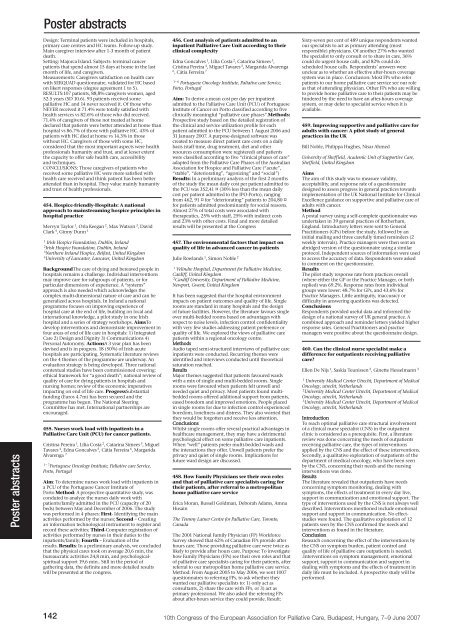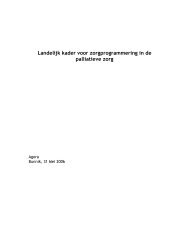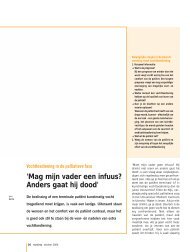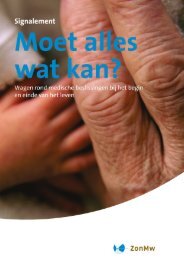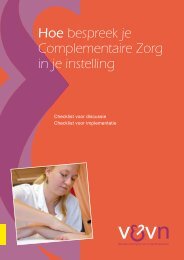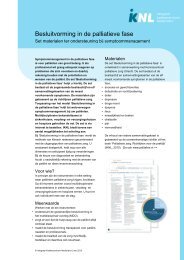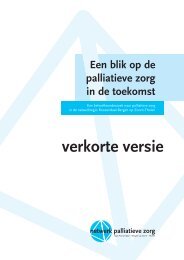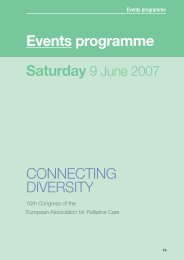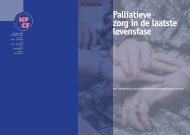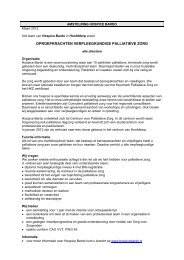Poster abstracts CONNECTING DIVERSITY
Poster abstracts CONNECTING DIVERSITY
Poster abstracts CONNECTING DIVERSITY
Create successful ePaper yourself
Turn your PDF publications into a flip-book with our unique Google optimized e-Paper software.
<strong>Poster</strong> <strong>abstracts</strong><br />
<strong>Poster</strong> <strong>abstracts</strong><br />
Design: Terminal patients were included in hospitals,<br />
primary care centres and HC teams. Follow-up study.<br />
Main caregiver interview after 1-3 month of patient<br />
death.<br />
Setting: Majorca Island. Subjects: terminal cancer<br />
patients that spend almost 15 days at home in the last<br />
month of life, and caregivers.<br />
Measurements: Caregivers satisfaction on health care<br />
with SERQUAD questionnaire, validated for HC based<br />
on likert responses (degree agreement 1 to 5).<br />
RESULTS:107 patients, 88,8% caregivers women, aged<br />
52.5 years (SD 10.6). 93 patients received some<br />
palliative HC and 14 never received it. Of those who<br />
NEVER received it 71.4% were totally satisfied with<br />
health services vs 82.6% of those who did received.<br />
71.4% of caregivers of those not treated at home<br />
declared that patients were better attended at home than<br />
hospital vs 86.7% of those with palliative HC. 43% of<br />
patients with HC died at home vs 14.3% in those<br />
without HC. Caregivers of those with some HC,<br />
considered that the most important aspects were health<br />
professionals humanity and trust, and at lesser extent<br />
the capacity to offer safe health care, accessibility<br />
and techniques.<br />
CONCLUSIONS: Those caregivers of patients who<br />
received some palliative HC were more satisfied with<br />
health care received and think patient has been better<br />
attended than in hospital. They value mainly humanity<br />
and trust of health professionals.<br />
454. Hospice-friendly-Hospitals: A national<br />
approach to mainstreaming hospice principles in<br />
hospital practice<br />
Mervyn Taylor 1 , Orla Keegan 2 , Max Watson 3 , David<br />
Clark 4 , Ginny Dunn 1<br />
1<br />
Irish Hospice Foundation, Dublin, Ireland<br />
2<br />
Irish Hospice Foundation, Dublin, Ireland<br />
3<br />
Northern Ireland Hospice, Belfast, United Kingdom<br />
4<br />
University of Lancaster, Lancaser, United Kingdom<br />
BackgroundThe care of dying and bereaved people in<br />
hospitals remains a challenge. Individual interventions<br />
may improve care for subgroups of patients, or for<br />
particular dimensions of experience. A “systems”<br />
approach is also needed which acknowledges the<br />
complex multi-dimensional nature of care and can be<br />
generalized across hospitals. In Ireland a national<br />
programme focuses on improving experience of<br />
hospital care at the end of life, building on local and<br />
international knowledge, a pilot study in one Irish<br />
hospital and a series of strategy workshops. AimsTo<br />
develop interventions and demonstrate improvement in<br />
four areas of end of life care in hospitals: 1) Integrated<br />
Care 2) Design and Dignity 3) Communications 4)<br />
Personal Autonomy. ActionsA 3 year plan has been<br />
devised and is in progress. 18 (50%) of Irish acute<br />
hospitals are participating. Systematic literature reviews<br />
on the 4 themes of the programme are underway. An<br />
evaluation strategy is being developed. Three national<br />
contextual studies have been commissioned covering:<br />
ethical framework for “a good death”; national review of<br />
quality of care for dying patients in hospitals and<br />
nursing homes; review of the economic imperatives<br />
impacting on end of life care. ProgressSubstantial<br />
funding (Euros 4.7m) has been secured and the<br />
programme has begun. The National Steering<br />
Committee has met. International partnerships are<br />
encouraged.<br />
455. Nurses work load with inpatients in a<br />
Palliative Care Unit (PCU) for cancer patients.<br />
Cristina Pereira 1 , Lília Costa 2 , Catarina Simees 3 , Miguel<br />
Tavares 4 , Edna Goncalves 5 , Cátia Ferreira 6 , Margarida<br />
Alvarenga 7<br />
1– 7<br />
Portuguese Oncology Institute, Paliative care Service,<br />
Porto, Portugal<br />
Aim: To determine nurses work load with inpatients in<br />
a PCU of the Portuguese Cancer Institute of<br />
Porto Method: A prospective quantitative study, was<br />
conduted to analyze the nurses daily work with<br />
patients/family admitted in the PCU (capacity of 20<br />
beds) between May and December of 2006. The study<br />
was performed in 4 phases: First- Identifying the main<br />
activities performed by the nurses; Second – Creating<br />
an information technological instrument to register and<br />
record these activities; Third-Computer registration of<br />
activities performed by nurses in their duties to the<br />
inpatients/family; Fourth – Evaluation of the<br />
results. Results: In a preliminary analysis, we concluded<br />
that the physical cares took on average 20,6 min, the<br />
bureaucratic activities 24,8 min, and psychologicalspiritual<br />
support 19,6 min.. Still in the period of<br />
gathering data, the definite and more detailed results<br />
will be presented at the congress.<br />
456. Cost analysis of patients admitted to an<br />
inpatient Palliative Care Unit according to their<br />
clinical complexity<br />
Edna Goncalves 1 , Lília Costa 2 , Catarina Simees 3 ,<br />
Cristina Pereira 4 , Miguel Tavares 5 , Margarida Alvarenga<br />
6<br />
, Cátia Ferreira 7<br />
1– 6<br />
Portuguese Oncology Institute, Paliative care Service,<br />
Porto, Portugal<br />
Aim: To derive a mean cost per day per inpatient<br />
admitted to the Palliative Care Unit (PCU) of Portuguese<br />
Institute of Cancer on Porto classified according to five<br />
clinically meaningful “palliative care phases”.Methods:<br />
Prospective study based on the detailed registration of<br />
the clinical and service utilization profile for each<br />
patient admitted to the PCU between 1 August 2006 and<br />
31 January 2007. A purpose-designed software was<br />
created to measure direct patient care costs on a daily<br />
basis (staff time, drug treatment, diet and other<br />
resources consumption were registered) and patients<br />
were classified according to five “clinical phases of care”<br />
adapted from the Palliative Care Phases of the Australian<br />
Association for Hospice and Palliative Care (“acute”,<br />
“stable”, “deteriorating”, “agonizing” and “social”)<br />
Results: In a preliminary analysis of the first 2 months<br />
of the study the mean daily cost per patient admitted to<br />
the PCU was 352,41 ¤ (30% less than the mean daily<br />
cost per patient admitted to the IPO-Porto), ranging<br />
from 462, 91 ¤ for “deteriorating” patients to 204,80 ¤<br />
for patients admitted predominantly for social reasons.<br />
Almost 27% of total costs were associated with<br />
therapeutics, 25% with staff, 25% with indirect costs<br />
and 23% with other costs. Final and more detailed<br />
results will be presented at the Congress<br />
457. The environmental factors that impact on<br />
quality of life in advanced cancer in-patients<br />
Julie Rowlands 1 , Simon Noble 2<br />
1<br />
Velindre Hospital, Department for Palliative Medicine,<br />
Cardiff, United Kingdom<br />
2<br />
Cardiff University, Department of Palliative Medicine,<br />
Newport, Gwent, United Kingdom<br />
It has been suggested that the hospital environment<br />
impacts on patient outcomes and quality of life. Single<br />
rooms are standard in many hospitals and the design<br />
of future facilities. However, the literature favours single<br />
over multi-bedded rooms based on advantages with<br />
respect to noise levels, infection control confidentiality<br />
with very few studies addressing patient preference or<br />
quality of life. We explored the views of palliative care<br />
patients within a regional oncology centre.<br />
Methods<br />
Audio taped semi-structured interviews of palliative care<br />
inpatients were conducted. Recurring themes were<br />
identified and interviews conducted until theoretical<br />
saturation reached.<br />
Results<br />
Major themes suggested that patients favoured wards<br />
with a mix of single and multi-bedded rooms. Single<br />
rooms were favoured when patients felt unwell and<br />
needed quiet and privacy. Most patients found multibedded<br />
rooms offered additional support from patients,<br />
eased boredom and improved emotions. People placed<br />
in single rooms for due to infection control experienced<br />
boredom, loneliness and distress. They also worried that<br />
they would be forgotten and receive less attention.<br />
Conclusions<br />
Whilst single rooms offer several practical advantages in<br />
healthcare management, they may have a detrimental<br />
psychological effect on some palliative care inpatients.<br />
When “well” patients prefer multi-bedded wards and<br />
the interactions they offer. Unwell patients prefer the<br />
privacy and quiet of single rooms. Implications for<br />
future ward design are discussed.<br />
458. How Family Physicians see their own roles<br />
and that of palliative care specialists caring for<br />
their patients, after referral to a metropolitan<br />
home palliative care service<br />
Erica Moran, Russell Goldman, Deborah Adams, Amna<br />
Husain<br />
The Temmy Latner Centre for Palliative Care, Toronto,<br />
Canada<br />
The 2001 National Family Physician (FP) Workforce<br />
Survey showed that 62% of Canadian FPs provide after<br />
hours care. Those providing palliative care were twice as<br />
likely to provide after hours care. Purpose: To investigate<br />
how Family Physicians (FPs) see their own roles and that<br />
of palliative care specialists caring for their patients, after<br />
referral to our metropolitan home palliative care service.<br />
Method: From August 2005 to May 2006, we sent 1007<br />
questionnaires to referring FPs, to ask whether they<br />
wanted our palliative specialists to: 1) only act as<br />
consultants, 2) share the care with FPs, or 3) act as<br />
primary professional. We also asked the referring FPs<br />
about after-hours service they could provide. Result:<br />
Sixty-seven per cent of 489 unique respondents wanted<br />
our specialists to act as primary attending (most<br />
responsible) physicians. Of another 27% who wanted<br />
the specialist to only consult or to share in care, 36%<br />
could do urgent house calls, and 82% could do<br />
scheduled house calls. Respondents’ answers were<br />
unclear as to whether an effective after-hours coverage<br />
system was in place. Conclusion: Most FPs who refer<br />
patients to our home palliative care service see our role<br />
as that of attending physician. Other FPs who are willing<br />
to provide home palliative care to their patients may be<br />
hindered by the need to have an after-hours coverage<br />
system, or may defer to specialist service when it is<br />
available.<br />
459. Improving supportive and palliative care for<br />
adults with cancer: A pilot study of general<br />
practices in the UK<br />
Bill Noble, Philippa Hughes, Nisar Ahmed<br />
University of Sheffield, Academic Unit of Supportive Care,<br />
Sheffield, United Kingdom<br />
Aims<br />
The aim of this study was to measure validity,<br />
acceptability, and response rate of a questionnaire<br />
designed to assess progress in general practices towards<br />
implementation of the UK National Institute for Clinical<br />
Excellence guidance on supportive and palliative care of<br />
adults with cancer.<br />
Method<br />
A postal survey using a self-complete questionnaire was<br />
undertaken in 39 general practices of Rotherham,<br />
England. Introductory letters were sent to General<br />
Practitioners (GPs) before the study, followed by an<br />
initial mailing and three carefully timed reminders (2<br />
weekly intervals). Practice managers were then sent an<br />
abridged version of the questionnaire using a similar<br />
protocol. Independent sources of information were used<br />
to access the accuracy of data. Respondents were asked<br />
to comment on the questionnaire.<br />
Results<br />
The pilot study response rate from practices overall<br />
(where either the GP or the Practice Manager, or both<br />
replied) was 69.2%. Response rates from individual<br />
groups were lower: 48.7% for GPs, and 43.6% for<br />
Practice Managers. Little ambiguity, inaccuracy or<br />
difficulty in answering questions was detected.<br />
Conclusions<br />
Respondents provided useful data and informed the<br />
design of a national survey of UK general practice. A<br />
combined approach and reminder letters yielded higher<br />
response rates. General Practitioners and practice<br />
managers were positive about the questionnaire design.<br />
460. Can the clinical nurse specialist make a<br />
difference for outpatients receiving palliative<br />
care?<br />
Ellen De Nijs 1 , Saskia Teunissen 2 , Ginette Hesselmann 3<br />
1<br />
University Medical Center Utrecht, Department of Medical<br />
Oncology, utrecht, Netherlands<br />
2<br />
University Medical Center Utrecht, Department of Medical<br />
Oncology, utrecht, Netherlands<br />
3<br />
University Medical Center Utrecht, Department of Medical<br />
Oncology, utrecht, Netherlands<br />
Introduction<br />
To reach optimal palliative care structural involvement<br />
of a clinical nurse specialist (CNS) in the outpatient<br />
clinic is considered as a prerequisite. First, a literature<br />
review was done concerning the needs of outpatients<br />
receiving palliative care, the types of interventions<br />
applied by the CNS and the effect of these interventions.<br />
Secondly, a qualitative exploration of outpatients of the<br />
department of medical oncology, who have been seen<br />
by the CNS, concerning their needs and the nursing<br />
interventions was done.<br />
Results<br />
The literature revealed that outpatients have needs<br />
concerning symptom monitoring, dealing with<br />
symptoms, the effects of treatment in every day live,<br />
support in communication and emotional support. The<br />
type of interventions used by the CNS is not always well<br />
described. Interventions mentioned include emotional<br />
support and support in communication. No effectstudies<br />
were found. The qualitative exploration of 12<br />
patients seen by the CNS confirmed the needs and<br />
interventions as found in the literature.<br />
Conclusion<br />
Research concerning the effect of the interventions by<br />
the CNS on symptom burden, patient control and<br />
quality of life of palliative care outpatients is needed.<br />
.Interventions on symptom management, emotional<br />
support, support in communication and support in<br />
dealing with symptoms and the effects of treatment in<br />
daily life must be included. A prospective study will be<br />
performed.<br />
142 10th Congress of the European Association for Palliative Care, Budapest, Hungary, 7–9 June 2007


